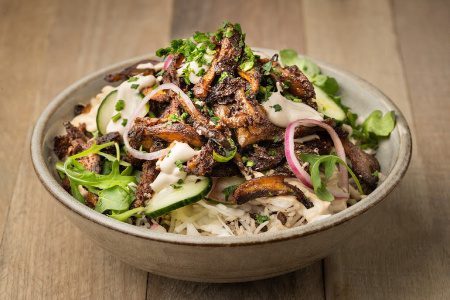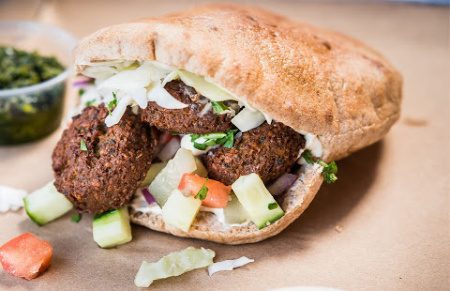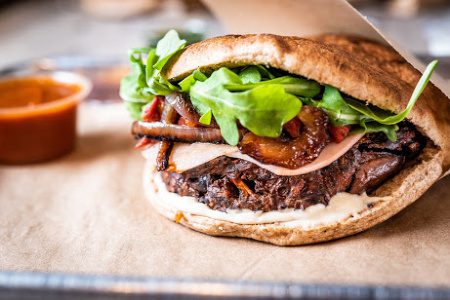
When Shouk owner Ran Nussbacher founded what would become an award-winning Israeli street food chain, he was on a mission both to pivot from his previous career and make a difference in the world.
Shouk serves certified kosher food that is also vegan and vegetarian, but most customers don’t come there for that reason. They come because the food is delicious.
“It got started around a mission to make plant-based eating more accessible and appealing to the masses with the intent of opening up people’s palates and minds to this way of eating and helping them incorporate more plant-based food into their lives,” Nussbacher said.
Shouk has garnered numerous recognitions. The Shouk Burger has been featured on Food Network’s “The Best Thing I Ever Ate” and was also voted best burger by The Washington Post. The Breakfast Pita was voted most innovative dish by QSR Magazine. And the eatery was voted Best Fast Casual in D.C. for three years by The Washington Post and D.C. Eater.
Nussbacher said his team developed the famous Shouk Burger by first sampling many veggie burgers around the country. That process allowed them to understand what they did not want in a veggie burger.
“Unlike a lot of veggie burgers, ours is not dry and doesn’t fall apart halfway through,” he said. “It’s not trying to imitate beef, which is important. It is intending to be a very, very good veggie burger, and then we put our kind of own Israeli spin on it.”
It’s touted as one of the best of any kind of burger in the country.
“People travel far and wide to come see us specifically for that dish,” he said.
Shouk also recently launched a mushroom-based shawarma dish. Nussbacher calls it one of the eatery’s best items. Some of the online reviews describe it as among the best shawarmas ever tasted.

“They don’t even realize they’ve actually eaten a mushroom-based shawarma and not a chicken one,” he said. “We see that a lot. That’s exciting for us.”
Nussbacher’s business partner, Dennis Friedman, is also the culinary genius behind the food. A fine-dining chef, Friedman has trained under Daniel Boulud in New York City and Alan Wong in Hawaii. Friedman went on to open a series of successful fine dining restaurants before joining Shouk.
“To have somebody of his training, skill level and experience in what is a fast casual restaurant environment allows us to put out what I would consider fine dining quality food but really, really fast,” Nussbacher said. “Unlike many fast casuals or quick service restaurants who are focused on making a bunch of food ahead of time, keeping it warm and then scooping it into your bowl or into your burrito, we do everything to order.”
Everything, he added, is made from scratch right in the Shouk kitchen. The hummus, for example, uses dried chickpeas soaked and cooked on site.
From Tech to Food
Nussbacher is new to the food business, but his experience in aviation, technology, sales and business development is influencing his company today. Born and raised in Israel, he completed mandatory military service there before coming to the United States for college, including earning his MBA.
Just before starting Shouk, Nussbacher was with Opower, an Arlington-based company focused on using software and psychology to change behaviors around energy consumption resulting in increased efficiencies and small changes spread over a large number of individuals to create a big impact.
“By multiplying those simple actions over millions of people across the country, we were able to literally take power plants off the grid and take CO2 out of the atmosphere simply by getting people to be more conscious about it,” he said. “I’ve seen firsthand how you can drive a big social impact on something that matters to all of us by getting people to take very, very small actions individually.”
Shouk leverages the same principle. Shouk isn’t out to convert its customers to veganism. Shouk just wants you to try their burger, or their cauliflower pita, or their falafel, and to make the food so delicious that you’ll come back week after week.

“For one individual, it’s obviously a very small change, but in the aggregate we’re driving meaningful impact on human health,” Nussbacher said. “We’re driving meaningful impact on environmental health, and of course, we’re doing a big favor to our fellow animals.”
Nussbacher said he became vegan as an adult after learning more about the food system and its impact on personal health and the planet.
“We can not only survive but also flourish on a diet that doesn’t require us eating animals anymore,” he said. “Once I got educated on what is actually required to bring a piece of chicken or a piece of steak onto our plates, everything that’s involved in that, and the damage that it’s caused along the way, coupled with what it does to our bodies when we consume that as opposed to how our body benefits from eating plants — vegetables, legumes, nuts and seeds — the data is pretty compelling, and so I had decided to run an experiment on myself and it became addictive. The more I did it, the better I felt, the more energy I had, the healthier I was. It was great. I’m the proof.”
While Shouk’s food is entirely plant-based, it isn’t marketed as such.
“We lead with our food identity, which is Israeli street food and our own unique take on that,” he said. “Most of our guests who come in the store are not vegetarian or vegan.”
Well over half of the guests coming for the first time don’t even realize they’re entering a vegan or vegetarian place, he said.
“It’s kind of irrelevant,” he said. “They’re there for the food experience, and that’s the whole point.”
Growth Mode

Shouk employs about 30 people and has two locations with plans to add more in the new year.
“Currently, we are in growth mode here in the Greater D.C. area, but certainly have our sights on national expansion down the road,” he said.
Shouk also has a relatively new catering program and has already seen several successes with organizations focused on appealing to a younger workforce that cares about eating healthy.
The company has also embraced technology from the first day, Nussbacher said. Even when the restaurant was just a few months old, they had in place online ordering, an option for delivery and were doing major investments in technology. Shouk recently launched an upgraded version of its online engagement platform, including an app, a loyalty program and its own Shouk label delivery service from within the app.
“Technology is big for us, something we are constantly going to invest in, probably at a level that is above what most restaurants our size do,” Nussbacher said.
And the menu will continue to change and evolve.
“We love coloring outside the lines,” he said. “We love doing things a little differently and even taking traditional Middle Eastern or Israeli cuisine and turning it on its head.”

